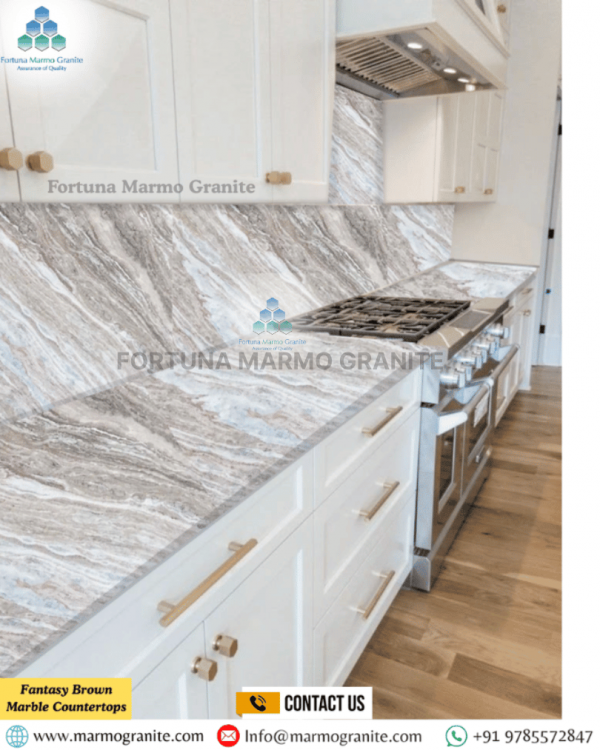How to Protect Your Marble Countertops from Acidic Spills: Tips for Long-Lasting Beauty
How to Protect Your Marble Countertops Marble countertops, with their timeless elegance, bring prestige, warmth, and character to any kitchen or bathroom. The rich veining, smooth texture, and silky feel make each piece truly unique — a masterpiece of nature's artistry.
However, marble is also porous and prone to damage. Acidic substances can easily compromise its surface. A splash of lemon juice, a forgotten wine glass, or even tomato sauce may leave a permanent etch mark. These blemishes can reduce the flawless beauty of your investment.
The good news? Protecting marble from spills and damage is simple with the right approach. With proper knowledge, consistent care, and easy routines, you can preserve its natural shine for decades. Use high-quality sealers, gentle pH-balanced cleaners, and act quickly after any spill.
This guide from Fortuna Marmo Granite — your trusted manufacturer and supplier of premium natural stones — shares practical tips to maintain marble's radiance. Follow these steps to ensure your countertops remain strong, beautiful, and timeless, while continuing to add warmth and character to your home.
Understanding the Enemy: Why Acid is Marble's Nemesis
- Before we delve into protection, it's crucial to understand why acidic substances are so detrimental to marble. Marble is primarily composed of calcium carbonate (CaCO₃), a naturally porous and somewhat delicate material. When an acidic substance — whether it's vinegar, lemon juice, wine, coffee, or even some household cleaning products — comes into contact with calcium carbonate, a chemical reaction occurs. This reaction, often referred to as "etching", slowly dissolves the calcium carbonate, causing a visible change in texture and appearance. The affected area may become dull, lighter in color, or even slightly rough to the touch, creating a permanent mark that disrupts the smooth, polished surface.
- This process happens much faster when the acid is left sitting on the stone, allowing it to seep further into its structure. Importantly, etching is not a stain; instead, it is a physical alteration of the stone itself — much like a form of erosion — which cannot be removed simply by cleaning or washing the surface. This is why understanding the vulnerability of marble to acid is a key first step in preserving its timeless allure and ensuring its long-lasting beauty for years to come.
Proactive Protection: The First Line of Defense
Sealing is Non-Negotiable: Your Marble's Invisible Shield
This is arguably the most crucial step in protecting your marble. Sealing marble involves applying a penetrating sealer that fills the microscopic pores within the stone, making it less absorbent. While a sealer won't make your marble impervious to etching (as etching is a chemical reaction, not just absorption), it will significantly slow down the penetration of liquids, giving you more time to wipe up spills before they cause damage.
- Frequency: Most experts recommend sealing marble countertops every 6-12 months, depending on the type of sealer used, the amount of traffic the countertop receives, and its exposure to moisture. A simple water droplet test can help you determine if your sealant is still effective: if water beads up on the surface, your sealer is still working. If it soaks in, it's time to reapply.
- Choosing a Sealer: Opt for a high-quality, penetrating sealer specifically designed for natural stone. Avoid topical sealers that sit on the surface, as they can peel or yellow over time.
- Professional Application vs. DIY: While professional sealing offers peace of mind and often uses industrial-grade products, DIY sealing is achievable with proper instructions. Always follow the manufacturer's instructions carefully.
Trivets, Coasters, and Cutting Boards: Your Everyday Allies
Trivets may seem small, but they play a big role. By shielding your marble from high heat, they prevent direct exposure that can damage the stone. Hot pots, pans, and baking dishes may cause etching if combined with an acidic spill. They can even trigger thermal shock, leading to small cracks or stress fractures. Always place a trivet under anything hot from the stove or oven.
Coasters are just as important. Every glass, mug, or bottle leaves behind condensation or acidic drips. Morning juice, coffee, or an evening glass of wine can all stain or etch marble. Using coasters as a habit protects your countertop from rings, stains, and etch marks.
Cutting boards serve as the first line of defense. Cutting directly on marble risks scratches, while many fruits and vegetables release natural acids that dull the finish. A cutting board safeguards both your food and your stone, keeping the surface flawless and long-lasting.
Prevention in Practice: Habits for a Marble-Friendly Home
- Mindful Food Preparation:
- Lemon and Lime Juices: Be extra careful when slicing citrus fruits or squeezing their juice. The slightest splash can etch. Consider doing these tasks over the sink or on a cutting board away from the marble.
- Vinegar and Oil: Be cautious when using vinegar-based dressings or cooking with vinegar.
- Tomato Products: Tomato sauce, ketchup, and fresh tomatoes are all acidic. Be mindful of spills during cooking and serving.
- Wine and Alcohol: Red wine is a notorious etcher and stainer. Be particularly careful with it. Many spirits also contain acids.
- Smart Cleaning Practices:
- Avoid Harsh Cleaners: Never use abrasive cleaners, acidic cleaners (like vinegar or lemon-based cleaners), or harsh chemicals (like bleach or ammonia) on your marble. These will etch or discolor the stone.
- Stick to pH-Neutral Cleaners: For daily cleaning, a mild, pH-neutral stone cleaner is your best bet. A simple solution of warm water and a few drops of mild dish soap can also work effectively.
- Soft Cloths Only: Always use soft cloths or sponges. Abrasive scrubbers can scratch the polished surface.
- Wipe Down Regularly: Regular wiping with a damp cloth can prevent dust and grime from building up, which can trap acidic residues.
Dealing with the Unavoidable: When Etching Happens
Despite your best efforts, an etch mark might still appear. Don't panic!
- Identify the Damage: Moreover, Determine if it's a stain (color absorbed into the stone) or an etch (dull, lighter area where the surface has been chemically altered). Acidic spills typically cause etching, though some acidic foods can also stain.
- Minor Etches: In addition, For very minor, superficial etches, sometimes a marble polishing powder can help restore some of the shine. These powders contain abrasive compounds that, when used gently and correctly, can buff out light damage. Always test in an inconspicuous area first.
- Deeper Etches: Yet, For more significant or widespread etching, professional help is recommended. A stone restoration specialist has the tools and expertise to re-hone and re-polish the marble, effectively removing the etch mark and restoring its original luster. Attempting to fix deep etches yourself can sometimes worsen the damage.
Conclusion
Indian Marble Supplier Protecting your marble countertops from acidic spills is not just a matter of preserving their appearance — it's a way of retaining their timeless allure, adding depth, character, and warmth to your space, and extending their lifespan for years to come. How to Protect Your Marble Countertops, Marble's natural softness makes it susceptible to etching, staining, and other forms of damage when exposed to acidic foods, liquids, or harsh chemicals. However, How to Protect Your Marble Countertops with proper care, vigilance, and a well-informed approach, you can keep your countertops looking rich, elegant, and spotless for a long time. Always make sure to clean up spills promptly, use pH-neutral products, avoid placing acidic items directly on the surface, and apply a high-caliber sealant regularly to provide an additional layer of protection.
Moreover, At Fortuna Marmo Granite, we're passionate about helping you maintain the inherent prestige and durability of your stone. How to Protect Your Marble Countertops Our team of skilled experts is here to guide you with tailored care routines, expert advice, and premium product recommendations, ensuring your marble countertops remain a stunning highlight in your home for generations to come. In addition, Let us be your trusted partner in preserving the enduring appeal of your investment — because when you care for your marble, it rewards you with a timeless, sophisticated ambiance that stands the test of time.



